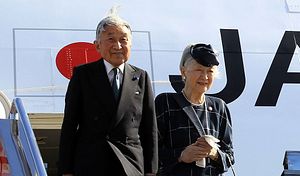On July 13 it suddenly became clear, via NHK News, that Japan’s present Emperor had a “wish” to abdicate. Then, on August 8, a televised message from the Emperor was broadcast. The subject of abdication quickly entered the public conversation in Japan, not just on television, but in magazines and on the Internet.
Many are now calling, implicitly or explicitly, for a change to the system to allow for abdication. This is the first time these calls have been made since the Constitution and the Imperial Household system were established in their current postwar form. In his televised message, the Emperor stressed “change” both in Japan and abroad, and conveyed his “thoughts” on how the current state of the Imperial household relates to that. The Constitution, however, stipulates that the Emperor has no political power. That begs the question: To what extent can the Emperor’s “thoughts” change the system? Still, surely it is important that the Emperor’s concerns be addressed. Either way, a number of issues have suddenly emerged.
The current administration of Shinzo Abe is becoming quite venerable by Japanese standards. For a while in the second half of the 2000s, Japan was changing governments at a rate of once a year. Even had the Emperor wanted to convey a message then, the administration receiving it would likely soon be out of power. For instance, the government of Yoshihiko Noda collapsed while in the middle of reforming the Imperial household. So it was not possible for those receiving the message to properly address the issue.
Now, however, with the Abe government under little apparent threat, the Emperor could direct his message at a government with the ability to respond. He could also reach out to the Japanese people.
In fact, the Japanese people are responsive, at least according to polls taken by newspapers after the message: 86.6 percent of respondents in a Kyodo poll conducted immediately after the Emperor’s message agreed that “abdication should be allowed,” together with 81 percent in a Yomiuri poll and 89 percent in a Nikkei poll. So Japanese opinion on abdication is clear. I am not aware to what extent the Imperial Household Agency had a predetermined strategy, but the current Emperor has earned a reputation for sincerity, and is widely trusted by the public.
Centered on the Prime Minister’s Office, preparations are now being made to study a procedure by which abdication could be possible. A committee of experts has been established to lead the study.
In fact, the potential for reform is broad. Could change go so far as amending the Constitution? Should the Imperial Household Law be revised? Or should a special law be passed just for this succession? There are a number of options.
But the key question is whether a long-term approach can be taken, one that goes beyond the current Abe administration. For example, even if the present issue is addressed with a special law, if there are also long-term proposals for revisions to the Imperial Household Law or even the Constitution, the next government will inherit them. For this reason, it would be better for the committee of experts to comprise more than just those close to the Abe administration. Rather, it should consist of people representing the broader community.
Newspapers have started to consider the passing of a special law as the most likely option. This would apply only to the present Emperor and allow him to abdicate. So far, the current administration has only been interested in short-term policy issues, so this looks like an option they can consider first. Given the current condition of the present Emperor, it appears that there is little time for study. Although those in favor of changing the Constitution (centered around the ruling party in both houses of the Diet) have secured the two thirds majority needed for constitutional change, there is still no clarity on what specific changes might be made. As far as I can see, this seems inevitable given the current political situation.
In that sense, the condition for studying Imperial succession possibilities is whether this matter can be inherited as a policy issue independent of individual governments. In other words, rules need to be put in place to accommodate changes in government.
Izuru Makihara is a professor at the Research Center for Advanced Science and Technology (RCAST), University of Tokyo.

































